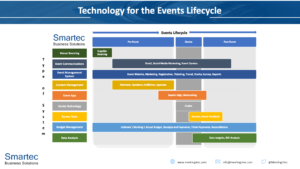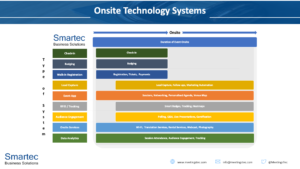Should Event Planners Work with Event Technologists?

Technology is always pushing the boundaries on how we plan and run events. Yet the scale of innovation we have seen over the past few years is making it difficult for event professionals to keep up. Many also feel that they don’t have the time or skills to manage effectively all the different technology systems they now use around their events.
Last month, a new research study from Eventsforce found that almost half of event planners (47%) say they have limited skills to make confident, informed decisions around their event tech investments, despite holding responsibility for it in the majority of organisations. And more interestingly, 56% said they expect to see the emergence of a new ‘event technologist’ role in the industry.
So what is an event technologist? How can they bring value to event organisations? And what impact can they have on event success?
We spoke to Arvi Virdee, event technology specialist and managing director of Smartec Business Solutions, to get a bit of insight on what the role entails and what kind of things organisers need to take into account before working with one.
What is an Event Technologist?
What is the primary role of the event technologist? Simply put, it is to manage all the technology and data related aspects of an event. This includes:
- Working strategically with the event director to plan the technology requirements for an individual event
- Planning the event journey for each delegate type
- Setting up the event website and registration process
- Configuring the event app
- Leading the badging system used onsite
- Assessing all the different event technology needs onsite
Just as important as assessing the needs for a single event, the event technologist should have the capacity to evaluate technology needs across all events – preferably over three years. This will help with sourcing the optimal system or systems strategically, as well as keeping costs down through standardisation.
The event technology ‘ecosphere’ is vast. The images below show some of the types of systems found during the events lifecycle:

And this image shows the types of systems used for on-site event management:

The event technologist should have a good grasp of all these types of systems, as part of their responsibility will be to help with sourcing the right system. This could be a single ‘end to end platform’ or a combination of different ‘best in class systems’.
Addressing the Challenges of Event Technology
The Eventsforce study also looked at some of the challenges event planners currently face when managing event tech for their organisations. The biggest issue for 65% of organisers is the time it takes to complete the procurement, implementation and integration process of their event technology systems.
In addition to that, there are many other areas that organisers typically struggle with that could be addressed by working with an event technologist:
- Creating different registration paths – clients, staff, speakers, management and VIPs all may need to have customised registration processes, which can be time-consuming to understand and configure
- Accommodation – hotel rooms may be allocated, but additional nights before and after the event dates (shoulder nights) may require payment by the delegate. Setting up inventory for these days and collecting payment can be complex
- Importing data – most systems provide templates to import data, ostensibly making it easy to structure your data ahead of an import. However, the data you have may not be in the right format – e.g., your data has the full name, but the template has different fields for first name and last name (or vice versa). Or you may be missing a mandatory field. In reality, a data import often requires a lot of Excel time (and skills) and repeated import attempts before a successful data import
- Event communications – from ‘Save the Date’ emails to post-event feedback, event emails can be automated. However, creating different email templates and understanding all the ‘data tags’ is not easy, nor is to set up all the automation workflows
- Website images – getting all images the right size (both in pixel size and byte size) requires some basic image resizing knowledge and understanding the difference between .png, .jpg and .gif. One common problem is to get a logo just the right size (possibly with space around it) so it renders correctly on any device or screen size
- Budgeting – the nuances of the events industry make it challenging to automate the budgeting process, which often starts with a high-level estimate, followed by quotes for several options before one is confirmed. Excel macros can help, but this still leaves much manual processing
Building a Case for Hiring an Event Technologist
One major part of the event technologist’s role will be in data management, as events generate vast volumes of data. As well as ensuring all the personal data meets data privacy requirements (such as GDPR), the consolidation and analysis of the data to deliver actionable insights and event ROI is a vital part of the role. This is especially the case now that organisations are increasingly moulding their events around data-driven strategies.
The Eventsforce research study, however, found that data management tops the list of tech tools organisations most struggled with. The latest ‘State of Event Technology Report’ from EventMB also states that more companies are now looking at data skills in senior event management positions. This need for ‘data skills’ could pave the way to more ‘event technologist’ roles.
So should organisations hire event technologists? Or should they create the role in-house?
That depends on the number and type of events an organisation does. If it isn’t a cost- effective option to have someone full time, then the role can be outsourced to a trusted specialist who has the skills to provide the services required whenever it’s needed.
Equally, you can look at creating the role using your existing team resources. Event planners tend to be multi-talented individuals who work at pace under stress. According to the study, 50% of event planners consider themselves as tech-savvy. So there is ample opportunity to identify one or more planners to function as a cross-event technologist. Skills to look out for include:
- Experience of using the various tools used during the events lifecycle, including project and task management, instant chat, video conferencing, time management, image editing, etc.
- A good grasp of business applications, such as a CRM system, office application suites, file storage and transfer, data protection, back-office needs, etc.
- Strong Excel skills, including filtering, pivot tables and import/export
- Understanding the benefits of integration between systems and present a business case where relevant
Conclusion
It is clear that the event tech ecosystem will continue to grow, with new tools, systems and platforms coming to the market to address specific needs organisers have around their events. There is a strong argument that event teams can benefit working with a dedicated event technology person, who understand event technology, who learns about it, researches what’s out there, can understand how the tech can be aligned to an event’s objectives and so on.
From Artificial Intelligence to facial recognition, events will continue to push the boundaries, and this diversity of choice is both an opportunity and a risk – how can you ensure you are using the right technology for your event needs?
A specialist event technologist may be able to help.
Would you like similar articles delivered to your inbox? Why not sign up to our weekly EventTech Talk newsletter for tips, analysis and research reports on all the latest technology and marketing trends shaping the events industry today.
